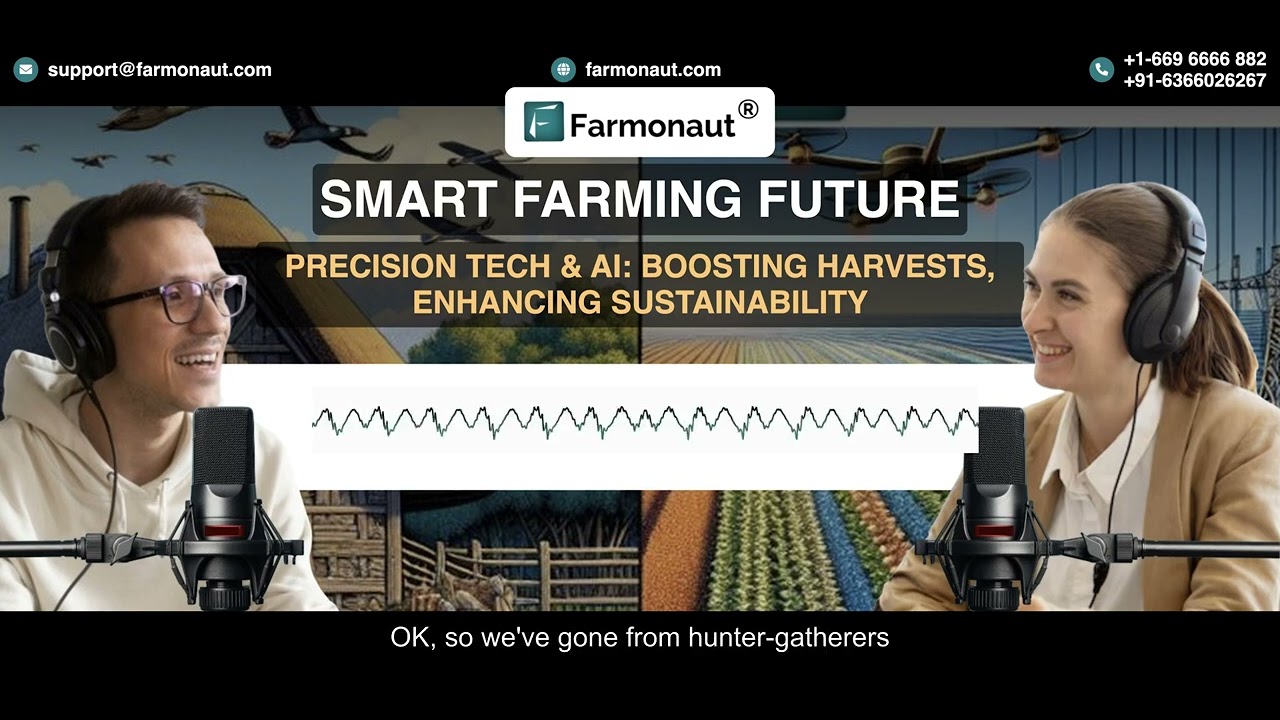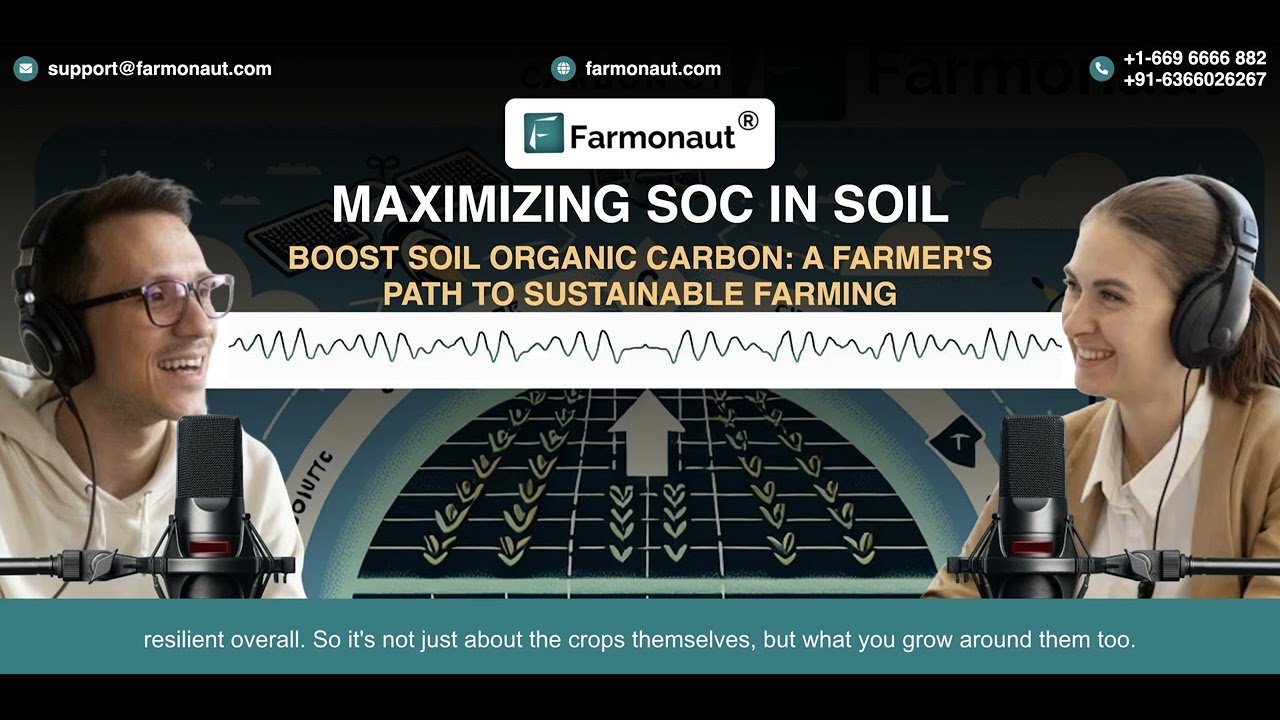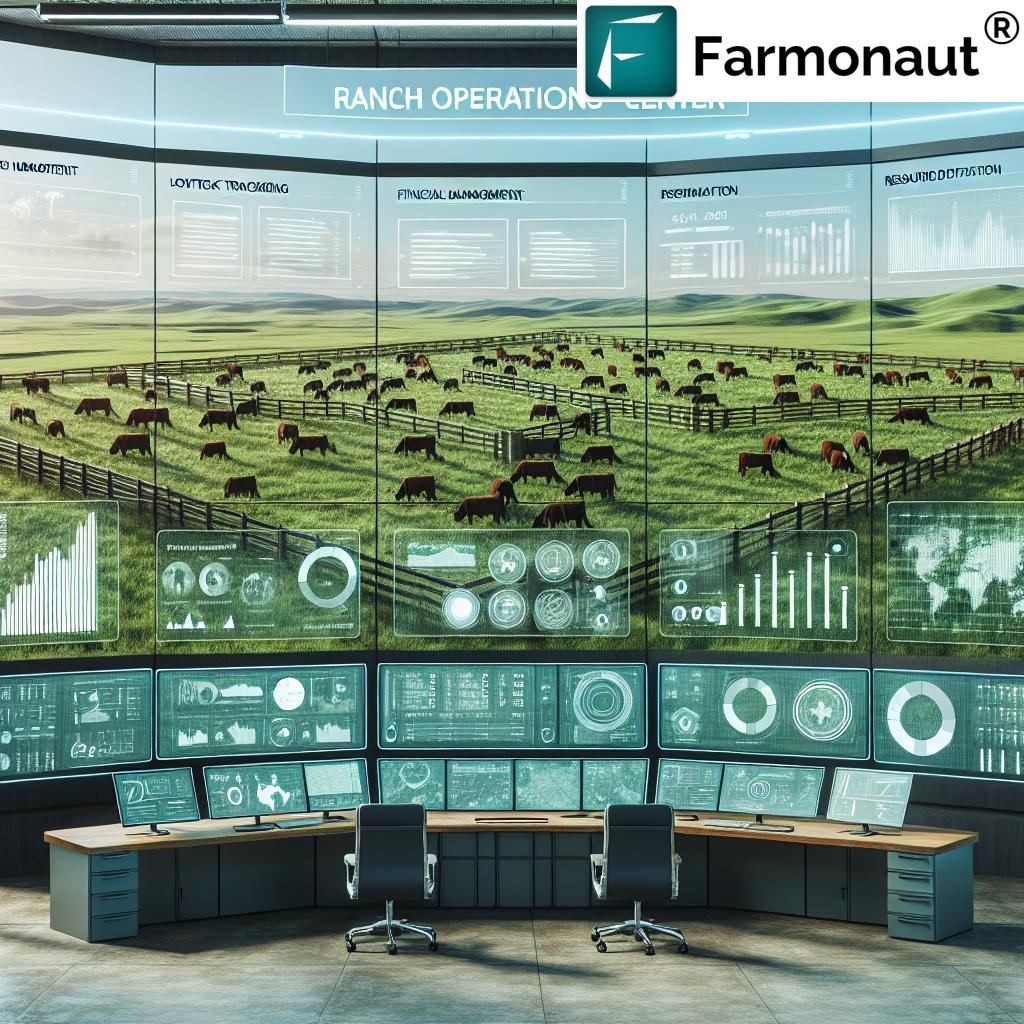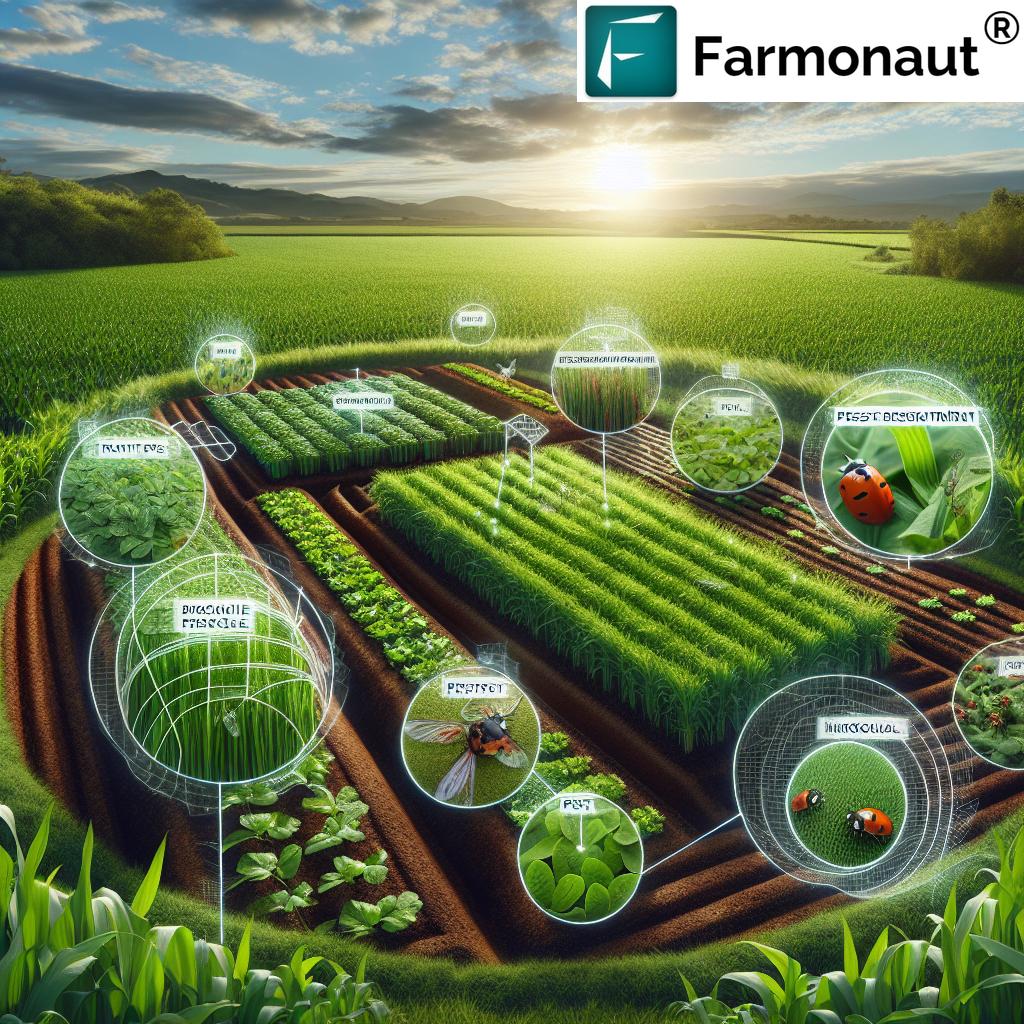Heritage Chickens & Cow Breeds: Gains for 2026 Farming
“Heritage chickens can reduce feed costs by up to 30% while supporting greater breed biodiversity on farms.”
- The Revival of Heritage Breeds: Why 2026 Needs Them
- What Are Heritage Breeds? Definitions & Distinctions
- Heritage Chickens: Resilience, Biodiversity & Market Demand
- Heritage Cow Breeds: Ecological & Economic Advantages
- Key Benefits Table: Heritage Chickens vs Herds (2025–2026)
- The Heritage Seed Market & Agrobiodiversity
- Market Opportunities, Consumer Trends & Local Advantages
- Challenges Faced by Heritage Breeds & The Road Forward
- How Farmonaut Satellite Solutions Empower Sustainable Farming
- FAQ: Heritage Breeds, Biodiversity & Regenerative Agriculture
- Conclusion: Heritage, Farming & The Sustainable Future
The Revival of Heritage Breeds: Why 2026 Needs Them
In our rapidly modernizing agricultural world, there’s a resurging interest in heritage chicken breed and heritage cow breeds that closely aligns with the core values of sustainable agriculture, biodiversity conservation, and resilient, local food systems. As we approach 2026, the global community continues to confront climate change, soil degradation, the loss of genetic diversity, and volatile food markets. In response, the revival of heritage breeds is more than a nostalgic journey—it’s a vital, informed movement to secure healthy, secure, and ecologically balanced agricultural systems.
Let’s explore why heritage chickens and heritage breed cattle are crucial for farmers, consumers, and food security in 2025, 2026, and far beyond.
What Are Heritage Breeds? Definitions & Distinctions
Heritage breeds refer to traditional livestock breeds and poultry that have been passed down through many generations. Unlike modern commercial breeds bred for maximum productivity—think rapid growth, high egg or milk yields, or uniform meat output—heritage breeds grow more slowly and are prized for their hardiness, adaptability, unique flavor, and genetic resilience.
- Heritage chickens represent living legacies—their unique genetic makeup has survived decades, often centuries, of agricultural history.
- Heritage cow breeds and heritage breed cattle maintain critical genetic diversity essential for the robustness and continued health of livestock systems.
These breeds have been adapted to local climates, making them more resistant to regional diseases, pests, and environmental challenges. As a result, they play a vital role in maintaining biodiversity and balancing ecosystems.
Why Focus on Heritage Breeds in 2026 and Beyond?
- The global agricultural landscape is increasingly dominated by a handful of commercial breeds—threatening a dramatic loss of breed diversity.
- Loss of diversity diminishes resilience, threatening food security as new pests, diseases, and climate shocks emerge.
- Heritage breeds are genetically superior in adaptability and offer crucial traits—longevity, disease resistance, robust productivity under low-input conditions.
In short, preserving and promoting heritage chickens and heritage cow breeds is essential to fostering resilient, sustainable food systems capable of supporting future generations.
Heritage Chickens: Resilience, Biodiversity & Market Demand
The Vital Importance of Heritage Chicken Breeds
Heritage chicken breeds—from Rhode Island Reds to Sussex and Plymouth Rocks—represent more than just alternatives to commercial broilers. In the context of sustainable agriculture, heritage chickens play a critical role in:
- Biodiversity: By maintaining multiple chicken breeds in the gene pool, farms can resist outbreaks, support ecosystems, and preserve unique traits for agriculture.
- Genetic Resilience: Unlike industrial poultry varieties, heritage chickens have higher disease resistance, especially against local parasites and pathogens.
- Adaptability: They thrive outdoors, forage naturally, and cope well with varied climates compared to their intensive-farming cousins.
- Flavor & Nutrition: Heritage chicken meat and eggs are often considered superior in taste and texture, with richer nutritional profiles.
- Reduced Input Costs: Their efficient foraging and disease resistance translate to lower feed and veterinary expenses.
Farmers seeking heritage chickens for sale near me are often motivated by the dual promise of robust, flavorful eggs and meat, and the ecological benefits they bring to organic farming practices.
Key Traits of Heritage Chickens (2025–2026)
- Foraging Ability: Heritage breeds actively seek out pasture-based feed resources, reducing reliance on synthetic inputs.
- Outdoor Robustness: With strong immune systems, they’re distinguished by their ability to withstand challenging environments and disease pressures.
- Slow Growth & Lower Productivity: While they grow slowly, their meat and eggs are prized for flavor and health benefits.
- Biodiversity Support: Each breed preserved is a genetic resource for future breeding and adaptation.
Heritage Chickens and Soil Health
Pasture-based rearing of heritage chickens supports better soil health. They play a role in breaking pest and weed cycles, contributing natural fertilizer, and promoting organic farming practices that restore ecosystem balance.
Why Do Consumers and Chefs Seek Heritage Chicken?
- Superior Taste: Heritage varieties provide flavorful meat and eggs preferred by top restaurants and foodies alike.
- Ethical Sourcing: They are raised humanely, with ample outdoor access, promoting animal welfare.
- Market Premium: Authentic heritage chicken products command premium prices at markets and direct-to-consumer sales.
Want to track the health of your flocks or optimize land use for your heritage poultry? Consider Farmonaut’s Large Scale Farm Management Platform—our satellite-driven platform helps with crop, pasture, and flock monitoring from anywhere on mobile or web, supporting sustainable rearing every season.
Explore our API & API Developer Docs for integrating satellite & weather intelligence for poultry, crop, and livestock monitoring.
“By 2026, farms using heritage cows show up to 40% higher genetic diversity than conventional herds.”
Heritage Cow Breeds: Ecological & Economic Advantages
Heritage Breed Cattle & Sustainable Systems
Heritage cow breeds and heritage breed cattle are irreplaceable participants in resilient, sustainable agriculture. These breeds—such as Ayrshire, Devon, Red Sindhi, and Highland—are adapted over generations to thrive in local environments, displaying exceptional traits:
- Adaptability: Tolerance to varied climates and low-quality feeds, maintaining productivity on marginal grazing lands.
- Disease & Parasite Resistance: Greater resilience against local pests and illnesses, reducing reliance on synthetic medicines and expensive interventions.
- Resource Efficiency: Efficient utilization of water, feed, and land, conserving resources and decreasing the environmental footprint.
- Genetic Security: Their diversity forms a “genetic bank” for future breeding—crucial as new challenges emerge with climate change.
Heritage breed cattle are often chosen for pasture-based, regenerative, and organic production systems, promoting soil health, biodiversity, and ecological farming practices.
How Do Heritage Cow Breeds Impact Sustainability (2025–2026)?
- Soil Health: Cattle from heritage breeds are integral to rotational grazing, boosting soil carbon, enhancing fertility, and reducing compaction.
- Carbon Footprinting: Efficient breeds emit less methane per unit of output—crucial in climate-smart agriculture. Discover Farmonaut’s Carbon Footprinting Tools for tracking and improving your herd’s environmental performance.
- Diversity in Products: Heritage cows provide distinctive milk, cheese, and beef, sought after by artisanal food markets and health-focused consumers.
- Lower Input Costs: Resilient breeds cut costs for veterinary care and feed, boosting farm viability and profitability for smallholders.
Heritage Cattle for the Local Market
- Specialty Dairy: Richer, more complex flavors attract local consumers and chefs, allowing farmers to command premium prices for their products.
- Beef Quality: Beef from heritage breed cattle is renowned for its marbling, superior texture, and natural taste, with health benefits over industrial meats.
For farmers, maintaining heritage cows is not only a strategic biodiversity investment—it’s an economic opportunity for 2026 and beyond.
Track, analyze, and improve your farm’s efficiency using Farmonaut’s Fleet & Resource Management Solution. Monitor grazing patterns and optimize vehicle routes for large herds—boosting profits and sustainability using actionable satellite data.
Key Benefits Table: Heritage Chickens vs. Heritage Cow Breeds for Sustainable Farming (2025–2026)
For farmers evaluating breed options, this comparative table highlights the unique 2025–2026 benefits of heritage chicken breed and heritage cow breeds. All data are representative based on typical breed performance and sustainability metrics.
| Breed Type | Breed Example | Biodiversity Contribution (Genetic Diversity Score / 10) | Sustainability Impact (Soil Health Improvement %) | Adaptability to Local Conditions | Resource Efficiency (Feed/Water Use Reduction %) | Projected Economic Benefit (ROI % for 2026) |
|---|---|---|---|---|---|---|
| Heritage Chickens | Rhode Island Red | 9.5 | 30 | High | 28 | 22 |
| Heritage Chickens | Plymouth Rock | 8.8 | 28 | High | 25 | 18 |
| Heritage Chickens | Sussex | 8.6 | 27 | Medium-High | 24 | 19 |
| Heritage Cow Breeds | Ayrshire | 9.2 | 36 | High | 23 | 20 |
| Heritage Cow Breeds | Red Sindhi | 9.7 | 39 | High | 27 | 25 |
| Heritage Cow Breeds | Highland | 8.9 | 35 | High | 20 | 17 |
- Biodiversity Scores are estimates reflecting breed diversity vs. commercial stocks.
- Soil Health Improvement (%)—refers to organic matter and soil carbon gains achieved by integrating the breed into rotational, pasture, or organic systems.
- Resource Efficiency relates to documented reductions in purchased feed/water use for heritage breeds.
- ROI (%) includes market premiums, reduced inputs, and improved product quality.
The Heritage Seed Market & Agrobiodiversity
Parallel Growth of the Heritage Seed Market
Heritage breed conservation aligns closely with the heritage seed market, where farmers increasingly prioritize heirloom and locally adapted seeds. The preservation of crop species richness is just as vital as livestock diversity. Key points:
- Agrobiodiversity: Heritage seeds display genetic diversity, making crops more resilient to disease, pests, and extreme weather events.
- Soil Health: Longer-rooted heritage crops improve soil structure and can fix atmospheric nitrogen or carbon—supporting regenerative practices.
- Food Security: Maintaining a broad spectrum of crop species ensures that, as conditions change, there are always plants capable of surviving and producing food.
Farmers who select heritage chicken breeds and heritage cow breeds often rely on strong, locally-adapted seed stocks: both strands of agrobiodiversity foster resilience and improve farm systems.
Why Is the Heritage Seed Market Gaining Momentum?
- The market rewards produce with unique flavor and local stories—driving up demand for heirloom varieties and heritage seed-grown crops.
- Adoption of regenerative agriculture and organic farming systems is expanding worldwide, elevating heritage seed demand.
Market Opportunities, Consumer Trends & Local Advantages
Growing Interest in Heritage Chickens & Cow Breeds: The 2025–2026 Outlook
As we approach 2026, consumers, chefs, and farmers alike are recognizing the importance of authentic, sustainably raised products—and are prepared to pay premiums for them. The market for heritage chickens, eggs, and beef is expected to grow rapidly, with demand supported by health-conscious consumers, and concerns about traceability, animal welfare, and environmental impact.
- Online searches for “heritage chickens for sale near me” and “local heritage cow breeds” are steadily rising, reflecting this widespread revival and resurging interest in sustainable options.
- Restaurants, artisanal markets, and direct-to-consumer channels offer new revenue streams for farmers focusing on heritage breeds.
- Products raised and certified as heritage fetch premium prices.
Farmonaut’s blockchain-powered Product Traceability Solutions help farmers and businesses guarantee the authenticity of their heritage products—empowering transparent, ethical supply chains for modern markets.
Key Market Considerations for Heritage Breed Farmers (2026+):
- Maintain breed integrity: Genetic dilution can reduce premium value—careful breeding and record-keeping are essential.
- Connect with local and regional markets: Leverage local consumer knowledge and preferences.
- Promote storytelling: Heritage products carry histories that resonate with buyers—highlight the breed’s legacy and benefits.
- Utilize modern satellite technology: Tracking and certification solutions boost both market access and ecological credentials.
Want to access loans or insurance more easily for your sustainable farming operation? Farmonaut’s Crop Loan & Insurance Verification uses real-time satellite data to help farmers prove environmental practices—speeding up financial approvals for resilient, organic, and heritage-based farms.
Challenges Faced by Heritage Breeds & The Road Forward
Despite the strong revival of interest, heritage breeds—both chickens and cow breeds—face several complex challenges:
- Genetic Dilution: Uncontrolled cross-breeding with commercial lines can erode unique characteristics of heritage breeds.
- Lack of Commercial Scale: Slow growth rates and smaller yields can deter large-scale adoption, impacting overall viability.
- Market Barriers: Much of the consumer base is still learning about heritage breed benefits; greater education is needed.
- Institutional Support: Breeding programs, grant funding, and technical assistance for heritage breed producers must be expanded.
- Ecological Pressures: Environmental degradation, habitat loss, and intensive monocultures limit sustainable integration opportunities.
The Way Forward: A Vision for 2026 & Beyond
- Foster Awareness: Farm support agencies, agricultural educators, and community groups must champion the ecological and economic virtues of heritage breed farming.
- Promote Farmer Networks: Breeding communities, seed exchanges, and heritage livestock alliances can maintain breed purity and market access.
- Enhance Traceability: Use blockchain and digital tools to assure consumers of breed integrity and sustainable rearing practices. Farmonaut’s traceability tools are leading the way.
- Expand Regenerative Systems: Integrate heritage breeds into crop-livestock-forest systems to maximize ecosystem services and long-term productivity.
How Farmonaut Satellite Solutions Empower Sustainable Farming
As a satellite technology leader, we at Farmonaut are proud to support the advancement of sustainable agriculture, biodiversity conservation, and the revival of heritage breeds. Our mission is to make satellite-driven insights affordable and accessible to all—allowing farmers to monitor, adapt, and thrive with resilience in the evolving landscape of 2026.
- Satellite-Based Monitoring: Track crop, soil, and livestock health for optimized decisions—improving both productivity and sustainability.
- Jeevn AI Advisory: Receive real-time, tailored advice for best practices in regenerative farming, heritage livestock rearing, and climate response.
- Blockchain Product Traceability: Verify every step of your supply chain—building market trust for heritage cattle, chickens, eggs, and crops.
- Fleet & Resource Management: Optimize movement and utilization of cattle, flocks, machinery, and staff for large and small operations.
- Environmental Impact Monitoring: Access data on your carbon, water, and environmental footprint, supporting compliance and continuous improvement.
Explore our tailored Farmonaut subscriptions below.
Farmonaut isn’t a seller or regulator—we provide the intelligence you need to build a more resilient, data-driven, and sustainable agricultural future.
FAQ: Heritage Breeds, Biodiversity & Regenerative Agriculture
- Q: What makes a breed “heritage” compared to standard commercial livestock?
- Heritage breeds are traditional animal breeds bred over many generations to adapt to local conditions, rather than for maximum commercial productivity. They retain a broad gene pool, offering resilience, disease resistance, and adaptability—unlike many industrial breeds bred for uniformity and fast growth.
- Q: Are heritage chickens more expensive to rear?
- While heritage chickens grow more slowly and lay fewer eggs per year, their ability to forage and resist disease can lower input costs by up to 30%. Their meat and eggs often fetch premium market prices, offsetting initial rearing costs.
- Q: Is there a market for heritage breed cattle and chickens?
- Yes! Consumer demand for authentic, sustainably produced food is growing. Heritage breed meat, eggs, and dairy are valued for flavor, nutrition, and ethical production, and can command significant market premiums.
- Q: How do heritage species help with climate change?
- Heritage breeds are more resilient to environmental fluctuations, disease outbreaks, and resource constraints. They improve soil health, increase biodiversity, and perform well in regenerative and resource-efficient farming systems—making farms more climate-resilient.
- Q: How can technology support heritage farming?
- Tools like Farmonaut’s satellite monitoring and blockchain traceability systems provide data-backed insights into crop, pasture, and livestock health. This advances productivity, market access, and ecological stewardship for heritage breed farmers.
Conclusion: Heritage, Farming & The Sustainable Future
As we look towards 2026 and beyond, heritage chicken breeds and heritage cow breeds stand as vital pillars supporting sustainable agriculture, biodiversity, and resilient food systems. Their unique genetic makeup and adaptability make them irreplaceable in the face of climate challenges, soil degradation, and the loss of diversity in modern food systems.
For farmers, heritage breeds are not just a link to agricultural history—they’re an investment in healthier, more adaptable, and profitable farm operations. For consumers, they offer unmatched flavor, nutrition, and ethical assurance. And for societies, they safeguard food security and ecosystem balance for future generations.
Preserving and reviving these breeds is a collective responsibility—and with cutting-edge satellite technology and data-driven solutions from Farmonaut, farmers and food producers can maximize the benefits of heritage systems while minimizing environmental impact. By embracing the legacy of heritage chicken and cow breeds, all of us can foster a greener, more secure, and truly sustainable agricultural future.
— Your Sustainable Food System Starts Here
Ready to secure your farm’s future with satellite-driven insights? 




















